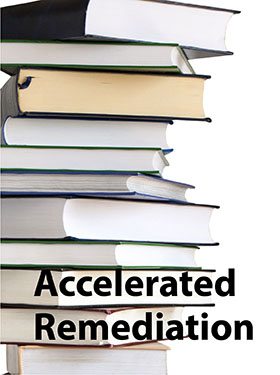Creating a pathway for students to be successful in their college careers is an ongoing debate in higher education, especially if developmental education is involved. Research shows that more than 50% of students entering community college require remediation, and only about 40% of those scheduled into remedial courses will complete those courses (Jones, Sugar, Baumgardner, Raymond, Moore, Davidson & Denham., 2012). Jones et al. (2012) suggest that the remedial “bridge to nowhere” is engineered for failure. In other words, the current remedial pathway is not successful for all students. The traditional format of providing remediation prior to entry into college-level courses is not the only option. As students enroll in higher education, there are other models that move a student into college-level work at a faster pace. Some methods include modularized courses, integrated content, accelerated learning models, and summer bridge programs (Radworth, Pearson, Chambers, & Ferlazzo, 2012).
Community colleges have recognized the negative impact of attrition for students who place into remedial courses. The fewer the remedial course requirements, the more likely the student will succeed. Combining classes can reduce the number of possible failures and potential college exits. This model for remediation is called acceleration. Additionally, for students who place on the border, this model provides an opportunity for academic momentum (Hodara, 2014). Through Pathways to Results, Lincoln Land Community College has established a new acceleration program and Elgin Community College will be expanding their existing program.
Lincoln Land Community College
This semester, Lincoln Land Community College (LLCC) is using an acceleration model in a single section pilot study. The highest levels of remedial reading and writing have been combined into a single course. The course has also been contextualized to provide relevance to the students in the criminal justice program. The instructor selected the book, The Other Wes Moore, by Wes Moore, as the reading text, and students will have writing assignments associated with the readings and criminal justice content. Currently, feedback from the developmental reading/writing faculty, the criminal justice faculty, and the students is positive. Data collection and success of students in college-level English will determine if the pilot is a success.
The first pilot cohort did not have a large number of criminal justice students in it. After an attempt to fill the section with only criminal justice students, LLCC opened up the section to other students. Therefore, LLCC cannot address the value of contextualization for the course. LLCC can, however, address the value of accelerating remedial reading and writing into one course. Surveys from the students showed the students understood the relationship between reading and writing, and these students would recommend this format to other students. At this time, LLCC is going to move forward with another pilot section of the accelerated model but will not focus on a particular content area.
Elgin Community College
The Accelerated Learning Program (ALP) began as a pilot at Elgin Community College (ECC) in the fall of 2013. The data compiled as seen in the chart below demonstrates this program has had a significant impact on student success. In 2014-15, the College institutionalized this program by supporting the expansion of the number of faculty and students participating.
Through this program, students who place in English 98 (the highest level of remediation in English) are eligible to co-enroll in college-level English. In order to provide consistency in instruction, the same instructor teaches both sections of English. Students complete the two courses simultaneously within one semester, providing them with six credits, three of which are college-level, upon completion. Students in the ALP consistently have higher success rates (grades A-C) than their college reading-ready peers who enroll in traditional English 98 sections (see figure).
Building on the success of the ALP, ECC plans to expand this model further to include transferable general education courses. The majority of general education courses have a minimum prerequisite requiring completion of developmental education coursework in English. With this pilot, those students enrolled in the ALP will be allowed to co-enroll in select general education courses. Two courses have been proposed based on their ability to satisfy general education core curriculum requirements for many college majors. In the fall of 2017, ECC plans to offer one of the two courses. Contextualized support will be provided for students based on faculty input.
As a result of this pilot, students will have access to college-level transferrable courses sooner and can earn six to nine transferrable credits in their first semester. Without this pilot, it would take a student one or more semesters to earn the same number of credits.
Although Lincoln Land Community College and Elgin Community College are two different institutions examining alternative pathways, the approach and goals are the same: reduce time spent on remediation in order to improve overall student success outcomes.
References
- Goldrick-Rab, S. (2010). Challenges and opportunities for improving community college student success. Review of Educational Research, (3), 437-469.
- Hodara, M. (2014). An examination of the impact of accelerating community college students' progression through developmental education. Journal of Higher Education, 85(2), 246-276.
- Jones, S., Sugar, T., Baumgardner, M., Raymond, D., Moore, W., Davidson, R., & Denham, K. (2012). Remediation: Higher education’s bridge to nowhere. Washington: Complete College America.
- Radworth, A., Pearson, J., Chambers E., and Ferlazzo, D. (2012, April). Remedial Coursework in Postsecondary Education: The Students, Their Outcomes, and Strategies for Improvement. Retrieved from ERIC database. (ED537852).
